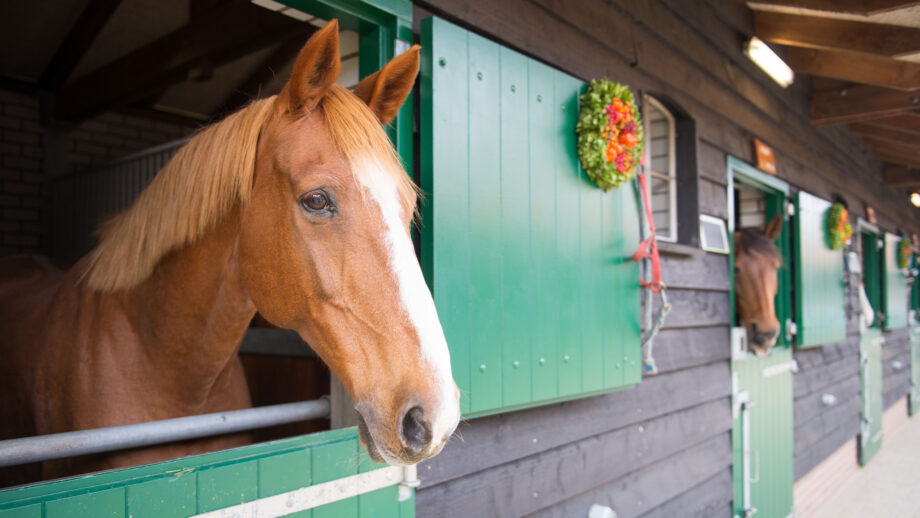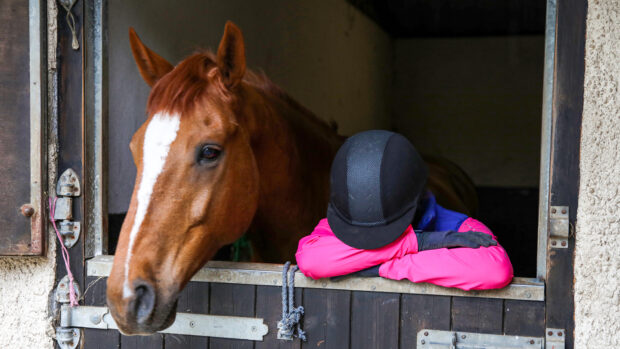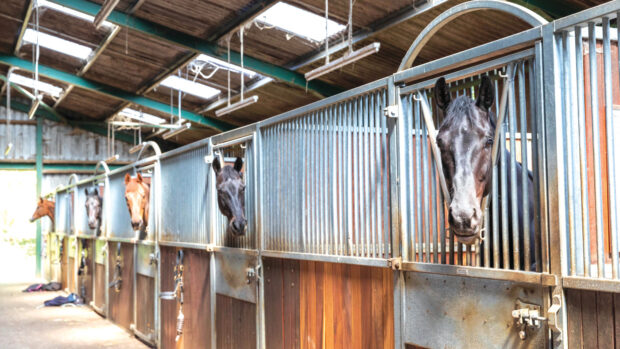While many people dream of keeping their horses at home – gazing out of the kitchen window to see their horse in the field, having complete autonomy over how their horse is managed and saving money – is it really all rainbows and sunshine? What are the pros and cons of keeping a horse at home?
“For those who are fortunate enough to keep their horse at home, they will benefit from reduced costs as they will not need to spend additional money on livery yard services. Being in close proximity to your horse will also mean that you can maintain a regular routine that is suitable to you and your horse’s needs. Not to mention how it’ll help you to build that unique and special bond,” says a BHS spokesperson.
While you don’t have to pay livery fees to keep your horses at home, the burden of managing the land falls to you. You are responsible for any rolling, harrowing or topping of the fields, maintaining the fencing and the stables alongside all the other jobs associated with land management.
You also need to ensure you have the amenities necessary to facilitate keeping your horses at home. You need sufficient grazing with safe, good quality fencing, a shelter or stables with drainage and ventilation, a secure tack room, a muck heap and a water source supplying clean fresh water. You will also need to arrange feed and bedding deliveries yourself and ensure you have enough space to store it. Don’t forget to consider security too, will your horse be safe on your land? Do you need to install security cameras or an alarm system?
Livery yards also often offer facilities that you are unlikely to be able to replicate at home. Things like horsewalkers, indoor and outdoor schools and access to showjumps and cross-country fences are expensive and require a vast amount of space, so you may not have the means or the space for them on your land.
Olivia Walker built three stables, a tack room and hay barn and fenced off two paddocks on her partner’s farm, where she lives, so she could move her pony Riley, an 18-year-old Connemara, there from a livery yard.
“The main reason I wanted to move Riley home was the cost. He’s quite a fussy pony and needs routine so he was on full livery which was costing me £600 a month,” says Olivia.
Olivia acquired a 14-year-old New Forest pony called Syd to keep Riley company as she didn’t want him living alone. Horses are herd animals and thrive in the company of others so if your horse would be living alone at home, obtaining a companion for them is another consideration.
“It’s early days but currently I’m really enjoying it. As well as saving me money in livery fees, I’m saving money on fuel and time as the yard was around 25 minutes’ drive away,” continued Olivia.
“My only real concern is if I’m going away who will come to the house and do the ponies. At the yard there was always someone around to ask to help or you could pay the owner to do it, but no one will be coming to my yard so that’s something I need to figure out.”
Keeping your horse at home can be lonely. As well as not having anyone to look after your horse if you are going away or running late, there’s also no one to hack out with or travel to competitions with, and no one to pick the brains of when you need advice.
“Keeping you horse at home isn’t always going to be easy. Horses require daily care which can be time consuming. Whether your horse is field-kept or stabled, they’ll need to be checked at least twice a day to make sure their health and welfare is maintained,” says a BHS spokesperson.
The time commitment that comes with keeping horses at home is something that has prompted Sally Anderson, who keeps four horses at her home near Cirencester, to contemplate a move back to a livery yard.
“Having them at home is so labour intensive. I work full-time and I’m finding that by the time I’ve done all the jobs – mucking out, feeding, poo picking etc. – I don’t have time to ride. If they were at a livery yard I could pay someone else to do those jobs so I could arrive, ride and then leave,” says Sally.
“The downside of livery yards is that they are expensive and they can have strict rules about things like turnout or feeding but if they have great staff, are well run and have like-minded people on them then I like having my horses there.”
- To stay up to date with all the breaking news from major shows throughout 2025, subscribe to the Horse & Hound website
You may also be interested in:

11 stable cameras that allow you to keep an eye on your horse 24/7

How to keep stabled horses happy and healthy

The H&H guide to types of livery
Unless you’re lucky enough to keep your horses at home, the chances are that at some point you’ve had to

Subscribe to Horse & Hound magazine today – and enjoy unlimited website access all year round




